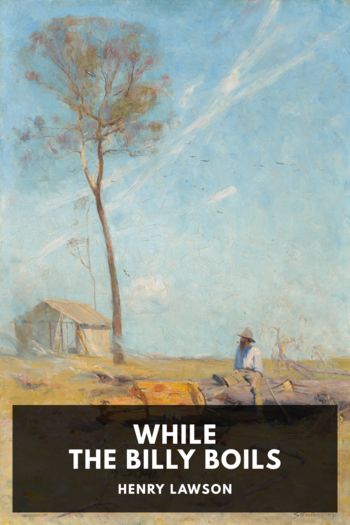While the Billy Boils Henry Lawson (best ereader for pc TXT) 📖

- Author: Henry Lawson
Book online «While the Billy Boils Henry Lawson (best ereader for pc TXT) 📖». Author Henry Lawson
After a long while we closed our book, and looking through the window, saw a hawker’s turnout which was too sorrowful for description.
We looked out again while the train was going slowly, and saw a teamster’s camp: three or four wagons covered with tarpaulins which hung down in the mud all round and suggested death. A long, narrow man, in a long, narrow, shoddy overcoat and a damp felt hat, was walking quickly along the road past the camp. A sort of cattle-dog glided silently and swiftly out from under a wagon, “heeled” the man, and slithered back without explaining. Here the scene vanished.
We remember stopping—for an age it seemed—at half a dozen straggling shanties on a flat of mud and water. There was a rotten weatherboard pub, with a low, dripping veranda, and three wretchedly forlorn horses hanging, in the rain, to a post outside. We saw no more, but we knew that there were several apologies for men hanging about the rickety bar inside—or round the parlour fire. Streams of cold, clay-coloured water ran in all directions, cutting fresh gutters, and raising a yeasty froth whenever the water fell a few inches. As we left, we saw a big man in an overcoat riding across a culvert; the tails of the coat spread over the horse’s rump, and almost hid it. In fancy still we saw him—hanging up his weary, hungry little horse in the rain, and swaggering into the bar; and we almost heard someone say, in a drawling tone: “ ’Ello, Tom! ’Ow are yer poppin’ up?”
The train stopped (for about a year) within a mile of the next station. Trucking-yards in the foreground, like any other trucking-yard along the line; they looked drearier than usual, because the rain had darkened the posts and rails. Small plain beyond, covered with water and tufts of grass. The inevitable, God-forgotten “timber,” black in the distance; dull, grey sky and misty rain over all. A small, dark-looking flock of sheep was crawling slowly in across the flat from the unknown, with three men on horseback zigzagging patiently behind. The horses just moved—that was all. One man wore an oilskin, one an old tweed overcoat, and the third had a three-bushel bag over his head and shoulders.
Had we returned an hour later, we should have seen the sheep huddled together in a corner of the yard, and the three horses hanging up outside the local shanty.
We stayed at Nyngan—which place we refrain from sketching—for a few hours, because the five trucks of cattle of which we were in charge were shunted there, to be taken on by a very subsequent goods train. The Government allows one man to every five trucks in a cattle-train. We shall pay our fare next time, even if we have not a shilling left over and above. We had haunted local influence at Comanavadrink for two long, anxious, heartbreaking weeks ere we got the pass; and we had put up with all the indignities, the humiliation—in short, had suffered all that poor devils suffer whilst besieging Local Influence. We only thought of escaping from the bush.
The pass said that we were John Smith, drover, and that we were available for return by ordinary passenger-train within two days, we think—or words in that direction. Which didn’t interest us. We might have given the pass away to an unemployed in Orange, who wanted to go out back, and who begged for it with tears in his eyes; but we didn’t like to injure a poor fool who never injured us—who was an entire stranger to us. He didn’t know what Out Back meant.
Local Influence had given us a kind of note of introduction to be delivered to the cattle-agent at the yards that morning; but the agent was not there—only two of his satellites, a Cockney colonial-experience man, and a scrub-town clerk, both of whom we kindly ignore. We got on without the note, and at Orange we amused ourself by reading it. It said:
“Dear Old Man—Please send this beggar on; and I hope he’ll be landed safely at Orange—or—or wherever the cattle go.—Yours, ⸻”
We had been led to believe that the bullocks were going to Sydney. We took no further interest in those cattle.
After Nyngan the bush grew darker and drearier; and the plains more like ghastly oceans; and here and there the “dominant note of Australian scenery” was accentuated, as it were, by naked, white, ring-barked trees standing in the water and haunting the ghostly surroundings.
We spent that night in a passenger compartment of a van which had been originally attached to old No. 1 engine. There was only one damp cushion in the whole concern. We lent that to a lady who travelled for a few hours in the other half of the next compartment. The seats were about nine inches wide and sloped in at a sharp angle to the bare matchboard wall, with a bead on the outer edge; and as the cracks had become well caulked with the grease and dirt of generations, they held several gallons of water each. We scuttled one, rolled ourself in a rug, and tried to sleep; but all night long overcoated and comfortered bushmen would get in, let down all the windows, and then get out again at the next station. Then we would wake up frozen and shut the windows.
We dozed off again, and woke





Comments (0)